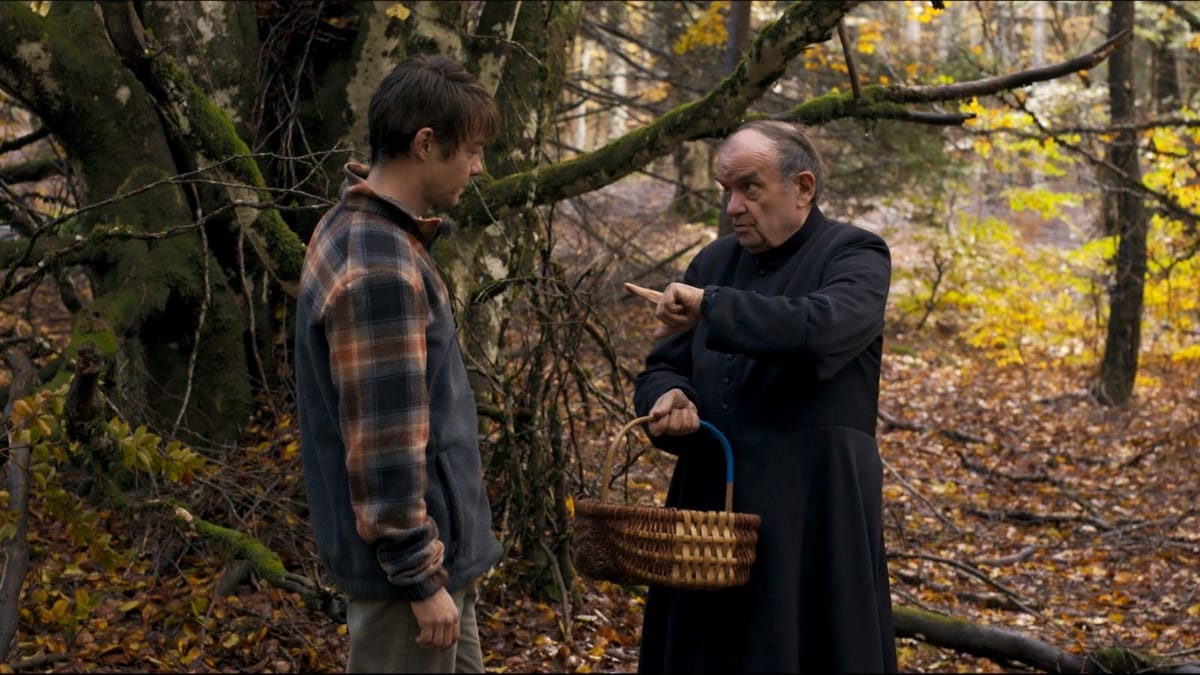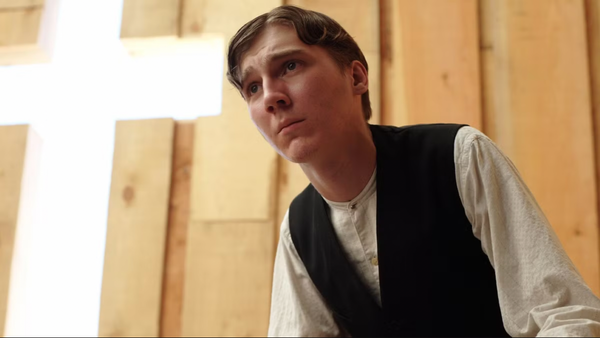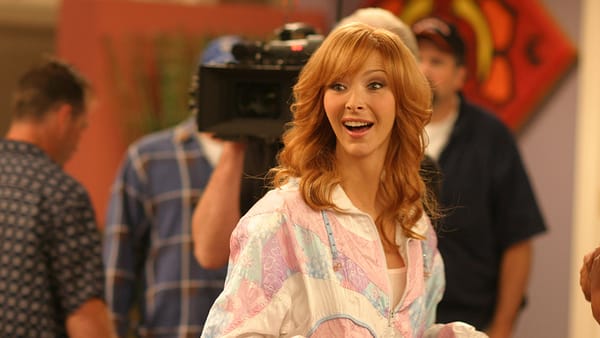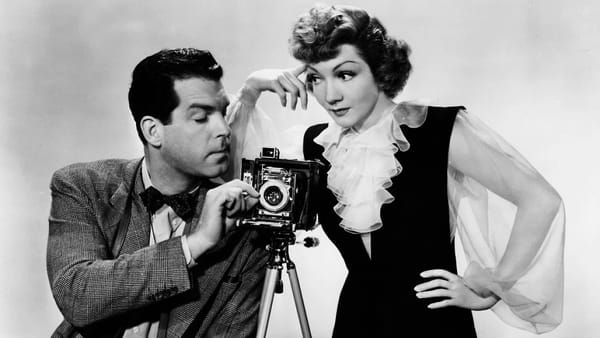In a Minor Key: On Alain Guiraudie's Misericordia (2024)
A heady potion, Alain Guiraudie's Misericordia possesses a very subtle derangement.

What makes a film a masterpiece? We tend not to build pantheons anymore — rather, we fill up our own individual treasure chests, and peek with glee into those of other people — but the pantheons of the past tended to be filled with great works: epics, sagas, sprawling works whose ambition was evident in their outsize dimensions. The Sistine Chapel; La Comédie Humaine; Abel Gance’s Napoléon (1927) with its runtime coming in anywhere between 5 and 9 hours; Der Ring des Nibelungen: it’s fair to say that we have learnt, at least within the Western canon, to admire grandeur. The epics of Homer, Virgil, Dante and Milton, Shakespeare’s sequence of 154 sonnets, European symphonies of the 18th century, Russian novels, and various royal palaces of extraordinary ambition and craft have doubtless contributed to our present understanding of great cinema as being played in a major key and striving to capture a vaguely defined totality of experience.
Of course, it would be foolish to pretend that critical views of film, and art in general, haven’t shifted in recent times. Just last week I wrote about changes to the accepted film canon, as exemplified by the Sight & Sound poll of 2022: in part, we no longer vibe with the idea of a canon; in part, people are happier to fill their personal canons with smaller fare, stuff that doesn’t pretend to greatness. Kelly Reichardt’s blissful comedy of manners set in the art world, Showing Up (2022), depicts an artist stubbornly and painstakingly labouring away at her craft; life gets in her way, she struggles, and in the end she produces… some really rather good, small works of art. No doubt that Reichardt’s film is a masterpiece, in my view, because of the explicitly minor key that it works in, which finds expression in the pointed metaphor of its main character’s metier.
So it is — in another mode entirely — with Alain Guiraudie’s strange and beguiling Misericordia, which it may be helpful to think of as you might a great short story by Lucia Berlin, or maybe a miniature by Sickert: work that sets itself smaller parameters but which captures something about the wider world; which holds some kind of sharp and gleaming truth. Misericordia is hilariously small in the world that it presents to us — a tiny village in the south of France, far from any big town. Here, we meet a bare-bones cast of characters whose identity is partly symbolic: a mother, a vicar, a baker, a son, a police officer. These are archetypes as much as characters, and Guiraudie sort of toys with them from above, like a wicked child playing God, making their Barbies fuck. The story is also a minor thing: a young baker, Jérémie, returns to his village for the funeral of his former boss; there is a murder; people suspect and desire one another; the end. But it is in the brushstrokes that Guiraudie gets there — his laconic wit and cruel irony; the oddly flat, bathetic tone that almost seems to taunt the viewer; a queer perspective that brings a kind of dizzy chaos to proceedings; and besides this a political outlook, which considers a dying rural France with tenderness, amusement, and some sorrow.
Misericordia has met with bafflement in some quarters, and it’s true that much about the film is willingly, even perversely, odd. But — to borrow a cheap phrase — that’s not a bug, it’s a feature. That is to say, Guiraudie sets his story in motion, and then proceeds to fall hilariously short of all our expectations as to its outcome: will the crime be solved? Who will get together with our young protagonist? Will he take over the vacant bakery? Ah, sweet children — you may as well ask if the princess and prince live happily ever after. In this film, the young hero is an oddly amoral agent of chaos; the mother doesn’t appear to love her son that much; the object of desire, Walter, is a grizzled slob in a dirty wife-beater; and the priest is hardly a man of God.
Misericordia possesses a very subtle derangement, that you need to adjust to in some way, by tuning your mind to a different wavelength. That dislocation is of a sort that does not even quite register as such, at least to begin with: imagine if you were watching a right-hander perform everyday tasks with their left hand for no particular reason besides mulishness. Only after observing them pick things up gingerly, drop something maybe, write their name in a weak scrawl, or open a lock with what feels like triumphant ease, might you realise that you had been watching something completely unusual, or in some way unreal. So it is with Misericordia, where so much feels off or artificial; for instance, when one character declares his love to another, after barely interacting together, it has the ring of something heard before but comes with a tinny clank. You may consider this odd, or perhaps it would be better to think of it as queer, in all senses of the word. Guiraudie is not interested in painting a straight picture of the countryside, even though — to add to the weirdness — his fantasy is firmly anchored in the real.
The film is set in a fictional village — Saint-Martial — but this place is situated within an existing world, just as Middlemarch is set in a verifiable Britain. The main character comes from Toulouse, and much is made of the village’s geographical surroundings in an interrogation scene where it becomes crucial that the real town of Millau should be situated at such and such a distance, and the bars there close at 11. Characters drink the traditional Pastis, and we hear an echo of the political reality of rural emigration to the city, via the gradual abandonment of the local bakery: villagers now buy their bread in bulk at the supermarket, decimating local businesses. All of this is almost documentary in the way it observes provincial life, like Maupassant’s short stories set in a recognisable Normandy. But the political reality of this world and the film’s perverse madness exist in a strange dynamic, as if fighting for supremacy over what should by rights be a little story of human interest, told kitchen-sink style.
I found a recent interview of Guiraudie by Isaac Feldberg at RogerEbert.com illuminating, for what it tells us of his intentions as a filmmaker. Asked about his fondness for the works of David Lynch, and the way that is reflected in Misericordia’s strange dream logic and erotic self-destructiveness, Guiraudie says:
David Lynch, for me, embodies something that’s incredibly important in cinema: he takes what is reality and he finds a cinematic territory—not a dream and not reality—that exists somewhere in between the two. It’s a very specific territory. And one theme that he has worked to further through his work—in films like Blue Velvet and Mulholland Dr.—is how the American Dream, which is such a strange concept, could turn into a nightmare. He has always been a political filmmaker, but in a highly poetic way. Many of the filmmakers that I admire the most, from Nanni Moretti to Pedro Almodóvar, have that goal in mind, but David Lynch is the one who actually succeeded.
I take two things from this. The first is that Almodóvar and Moretti are in many respects very unlike David Lynch, meaning that Guiraudie (correctly, I think) has a loose interpretation of what may be termed “Lynchian”: that is, a filmmaking that distorts reality in revelatory ways. This makes it less strange that Guiraudie might be considered an heir to Lynch: his world seems so totally removed from Lynch’s, because it is French where Lynch is deeply American, provincial where Lynch is urban or suburban, earthy where Lynch is glamorous, and homosexual where Lynch is — in my opinion — interested in probing at heterosexuality. And yet the parallels are there for all to see, in the unreality that exists in Misericordia and Guiraudie’s work in general; in the interest Guiraudie has in the underbelly of society; and in the way any permutation seems possible within his universe. Secondly, I find that although Moretti and Almodóvar are political, Lynch is less obviously or less overtly so: I accept, though, that he has an interest in the American Dream, and I think his puncturing of the associated “glamour” of America is subversive and has a political resonance. Guiraudie’s politics is similarly guarded, but of course it is there in the subject matter of Misericordia, in its location, and in the ambient queerness, which sees functions and identity as porous and changeable.
It is in this meshing of the political and the unreal, of the dreamlike and the tangible, of tradition and subversion, that Guiraudie is ambitious: these are the elements that set Misericordia on the path of greatness. And Guiraudie attains it in his manner of approaching these ambitions — namely, in his cinematic language, which is so counterintuitively precise and at times literary. That tone, landing somewhere between farce and morality tale, is wholly original and it amplifies all of Misericordia’s apparent contradictions, making it a confusing artefact, a heady potion.
I think of Misericordia — and I hope this description helps floundering viewers — as a throwaway Chaucerian story, drawing on a weird local news item read in a rural paper, as told by a flaming elder queer to a younger one at a cruising ground, over cheap booze warmed in the summer sun. The teller has been around, and chooses his words with care; he throws in a bit of colour — let’s say, a preposterous subplot to do with mushrooms — and some realistic particulars to give the story more pop; he confounds you with a passage in which he reveals a keen streak of morality; and finally brings all his characters and incidents back round in a flurry of activity towards a finale that… falls flat. You wished for another ending, and you say to the teller: “Oh come on — that’s how you’re leaving it?” And the teller says to you: “Why not?” And the sun is going down now, on that story, one of many in the world, real and made up at once, and going down on the world you live in — and you mull this over as you get up and look at the forest around you, remembering the woods from the story and their malevolent proceedings. Perhaps you have a new feeling in your body now: a sense of possibility; a crackle of danger. You say goodbye — you’ll see him again no doubt, sitting there smoking his cigarette, watching the boys go at it — and head off into the coming night.
Caspar answers cinephiles' questions in his regular advice column Psycho. Send him your thoughts and ideas anonymously at this link, no personal information is collected.



